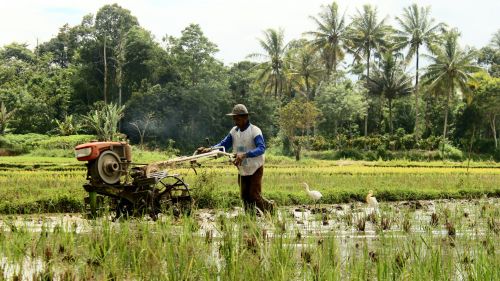Disasters Increase, Faux Financing, & a Fever Pact

Catch the week's top news and research in food, agriculture, and global development in our Global Food for Thought news brief.
Top Story
Supporting Black Farmers
The South African government has established a $340 million fund to give Black farmers more access to capital and to lower barriers to entry in commercial agriculture. The state-owned Industrial Development Corporation (IDC) will provide 80 percent of the funds through loans, and the government will provide the rest through via a grant. According to the IDC, Black farmers will be able to access assistance for developing, expanding, and acquiring farming operations. The fund’s announcement follows efforts earlier this month to accelerate the return of lands taken from Black South Africans during apartheid.
Council Insights
Tune In
Distinguished Fellow Dan Glickman and the Center on Global Food and Agriculture’s Managing Director Peggy Yih joined a panel during the Forum for the Future of Agriculture’s (FFA) Policy Week. If you missed the discussion on transatlantic cooperation, don’t worry! Video of the event is available to watch at any time. Next week, Distinguished Fellow Catherine Bertini will deliver a keynote address at the FFA 2021 Annual Conference on Food System Renewal.

Farm workers harvest spinach in South Africa.
Food & Agriculture
No Supports
In India’s state of Bihar, which abolished its public agricultural procurement system in 2006, farmers are likely to earn more money as farm laborers in other states than working their own land. Markets in Bihar are run by private traders who decide the rate for the harvest, which is often lower than the central government-mandated minimum support price.
Rescue Pests
Fall armyworm costs the continent of Africa as much as $4.6 billion annually. Field trials in Kenya have found that three native insect species are very effective at fighting the expensive pest. The technique could help reduce pesticide use for farmers, but scalability of the project is still a question.
Frog Farm
Illegal trafficking has driven several species of frogs to near extinction in Colombia. A company is breeding endangered frogs in captivity to mitigate poaching. Experts warn that marketing and cost-efficiency are crucial for the endeavor to be successful.
Deeper Dive
Fighting Bugs with Bugs?
Integrated pest management (IPM) is a strategy to prevent agricultural pests long-term through biological control, habitat manipulation, and other ecosystem-management techniques. IPM can be used to combat invasive plant species as well as persistent, devastating pests like the fall armyworm.
Data Crunch
Faux Financing
New data show that funding for faux meat and dairy start-ups tripled from 2019 to 2020. Plant-based products received the majority of investments, but fermentation and cell-based meat companies saw increases in funding, too.
Resilience
Disasters Strike
A new FAO study finds that natural disasters such as megafires, droughts, and locust swarms, are occurring three times as frequently than 40-50 years ago. The agricultural sector is responsible for absorbing a disproportionate 63 percent of the impacts of these threats, with low- and middle-income countries bearing the brunt.
Big Ideas
Opinion - Seaweed is no Panacea
Headlines have recently suggested that feeding cattle red algae could greatly reduce their methane footprint. Although seaweed additives in cattle feed can reduce methane in cow belches, it is a solution only practicable on feedlots. For the many cows that spend 89 percent of their life on pastures, seaweed would reduce their lifetime methane emissions by just 8.8 percent.
DC Report
Fever Pact
The USDA’s Animal and Plant Health Inspection Service (APHIS) has developed a protocol in collaboration with the Canadian Food Inspection Agency to continue bilateral trade in the event of an African swine fever outbreak in either country. Both agencies hope the pact will protect domesticated herds even if feral swine populations become infected with the virus.
Big Actors
Safety First
The IPPC, International Plant Protection Convention, sets phytosanitary standards to protect crops from spreading plant pests and diseases. This week the 15th Commission on Phytosanitary Measures, CPM-15, has begun and eleven new standards are expected to be adopted. As the COVID-19 pandemic continues the commission is paying careful attention to risks associated with the export and import of food products.
Trade & Commodities
Pork Plummet
Hog and cattle futures fell sharply this week as part of a larger commodities market selloff. Export and domestic meat demand remain strong, however, especially as restaurants ease pandemic restrictions. Some concerns about inflation linger, but mostly regarding pricier steaks and chops.

